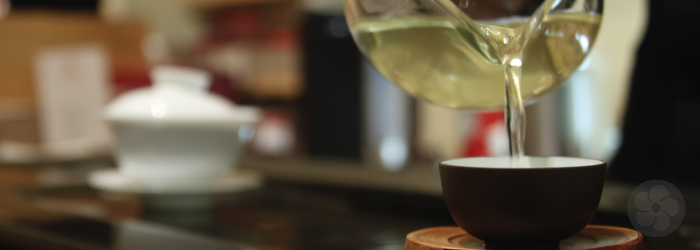5 Reasons Wine Aficionados Love Tea

We often use analogies to help new tea drinkers relate to unfamiliar teas. We find that It is easier to understand traditional teas in the modern context of third wave coffee, single origin chocolate, or even locally sourced vegetables. More than anything, though, wine makes an apt comparison, from the vast array of grape varieties to the aging potential of certain bottles. For wine lovers with developed palates, tea can offer a new (and nonalcoholic) world of taste and knowledge to explore. Here are five reasons people who appreciate wine will also love tea.
1. Variety and Terroir
Many wine drinkers enjoy the feeling of “time travel” that comes from understanding the origins of a bottle. The variety of grapes used, and the way they’re affected by the soil and weather conditions during each harvest year, are major factors in the final flavor of any wine. The same is true for tea.
Differences between varieties of Camellia sinensis tea plants can affect leaf size, caffeine content, and even define tea categories, as with white tea. Weather conditions can impact sugar content and speed of growth, changing the overall flavor profiles of each distinct harvest, even when they’re only days or weeks apart. For anyone who enjoys exploring the ever-shifting diversity of flavor in wine, single origin teas will not disappoint.
2. Tradition and Crafting
Just as winemakers develop their own processes and traditions to make the best of each grape harvest, tea crafters must learn through experience how to coax potential flavor from each batch of fresh leaves. Experts in both fields rely on regional traditions and personalized techniques to control and emphasize desirable tastes and textures in the mouth.
Any regional crafting tradition can provide a unique view into the culture of the area, whether it is Bordeaux blending or charcoal roasting in the Wuyi Mountains. Both wine and tea have had major influences on the various regions where they have become specialties. Just as regions like Burgundy or Champagne have become synonymous with their wines, many areas of China have built international reputations on their distinctive styles of tea.
3. Subtlety and Complexity
The trained palate of a wine lover is better prepared than most to recognize and appreciate the depth and complexity of flavors available in the world of tea. From soft and subtle to bold and complex, tea and wine span a similar flavor spectrum, with some obvious parallels. Lovers of sophisticated white wines will likely enjoy the bright, clean flavor of early harvest green or white teas, while anyone who likes a smokey Cabernet will probably feel right at home with the flavor profiles of black teas or aged pu-erh.
Of course, finding truly complex and interesting flavors is a bit more difficult than picking up a familiar brand of tea bags at the local grocery store. Just like mass produced wines, bagged teas are homogenized blends of mediocre harvests, made with quantity and consistency in mind, rather than high quality flavor. These mediocre teas are improved with a bit of milk and sugar, similar to inexpensive wines that make great sangria.
4. Food Pairings
With such obvious flavor parallels, it’s an easy leap from wine pairing to tea pairing. In fact, as interest in high quality teas has grown, some fine dining restaurants have begun employing “tea sommeliers”, who offer expertise in pairing teas with various dishes. Though Chinese tea drinkers typically stick to the teas produced in their home regions, the range of styles and flavors produces across China makes the pairing possibilities just as exciting as in wine.
Though tea can be successfully paired with any type of food, the traditional cuisines of tea growing regions pair naturally with the locally produced teas, and can offer a guide to getting started with tea pairing. In general, lighter teas like greens and whites come from areas along the eastern coast of China, where seafood and vegetable dishes are staple foods. In contrast, inland areas like Yunnan Province are famous for bold black teas and fermented pu-erhs, which complement the rich, fatty proteins like pork belly that are commonly eaten there.
5. Social Sharing
Finally, it can't be denied that one of the greatest pleasures in a bottle of wine comes from sharing it with family or friends. Whether opening a bottle in celebration or commiseration, sipping together offers a chance to chat and enjoy each other’s company. In China (and many other Asian cultures) tea often fills this role. In particular, the process of brewing gong fu cha is designed as a social event, where tea is sipped from small cups and the leaves are re-infused many times over the course of the conversation.
As with wine, the tea itself may be a topic of conversation, and for anyone that loves sharing the story of a bottle, tea offers a similar opportunity. The many parallels between production and flavor profiles make single origin teas ultimately relatable for any wine lover.
Sign up for our newsletter to get blog updates in your inbox!








Comments on this post (0)